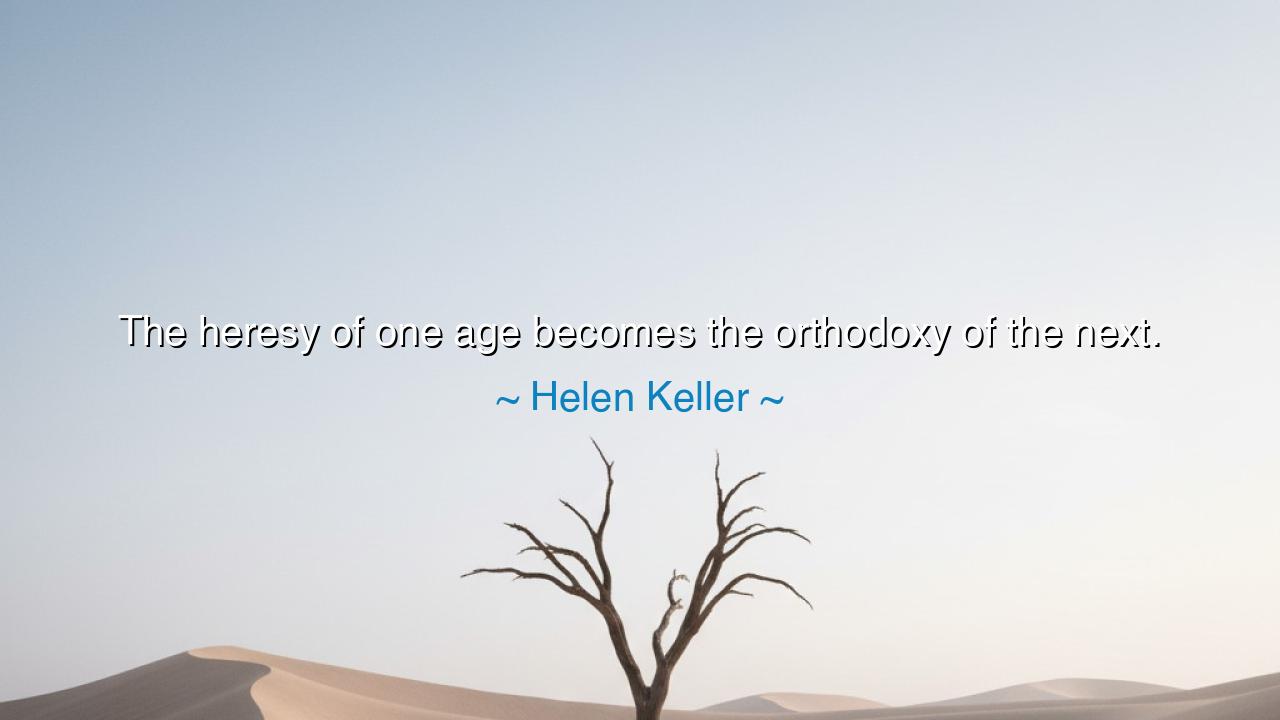
The heresy of one age becomes the orthodoxy of the next.






In the ever-turning wheel of time, truth and belief shift like the sands of the desert. What is considered heretical in one era often becomes the accepted wisdom of the next. This truth is captured in the words of the great Helen Keller, who said, "The heresy of one age becomes the orthodoxy of the next." These words speak to the fluidity of ideas, the way in which society and culture evolve, and how the things that are once rejected or challenged can, over time, become the bedrock of future understanding. It is a timeless lesson in the power of change and the transience of human perception, a reminder that certainty is often fleeting and that the course of history is shaped by those who dare to question the established norms.
The ancients were no strangers to this concept. The Greek philosophers—Socrates, Plato, and Aristotle—were all considered to be heretics in their time, challenging the prevailing views of the gods, the state, and the nature of humanity itself. Socrates, in particular, was condemned to death for his unconventional ideas, for daring to question the society that had long upheld traditional beliefs as absolute truth. His method of questioning, of challenging the very foundation of knowledge, was seen as a dangerous heresy. And yet, in time, his ideas would become the bedrock of Western philosophy and ethics, shaping the very institutions that later societies would build upon.
Consider, too, the story of Galileo Galilei, who, in the early 17th century, dared to challenge the geocentric view of the universe, which held that the Earth was the center of the cosmos. The Catholic Church condemned his ideas as heretical, and Galileo was forced to recant his support of the heliocentric theory, which proposed that the Earth revolved around the Sun. Yet, within a few generations, the very idea that was once blasphemous became scientific orthodoxy, as Newton and others further built on Galileo’s discoveries. What was once seen as an attack on the divine order became an accepted truth of the natural world. This is the pattern Keller speaks of—the transformation of heresy into orthodoxy.
The same can be said of the abolition of slavery, a cause that was once viewed as a radical and unacceptable idea. In the early years of the abolitionist movement, many people saw the idea of ending slavery as heresy—a direct challenge to the economic, social, and cultural systems that had existed for centuries. Yet, in the course of time, the abolition of slavery became the moral and legal foundation of many modern societies. The progressive thinkers of one age, who were vilified for their ideas, laid the groundwork for the freedom and equality that future generations would come to take for granted. What was once unthinkable became the moral imperative of the next age.
Keller’s words also speak to the power of innovation and progress, especially in a world that often resists change. Technology, too, follows this path. When the airplane was first introduced by Wright brothers, it was met with skepticism, and even mockery. The idea of humans flying was once considered a fantasy, but within a generation, it became a reality. The very idea of flight, which was once thought of as a delusion, became a global necessity, and now, aviation is the backbone of modern travel, commerce, and communication. This cycle of innovation transforming into accepted truth is the very nature of human progress, echoing Keller’s observation that what is seen as impossible today will likely be the foundation of tomorrow.
The lesson here is one of hope and perseverance. To those who challenge the status quo, to those who see a better future beyond the confines of today’s limitations, know that your ideas, your vision, may one day become the accepted truths of future generations. The path of progress is often one that is fraught with opposition and criticism, yet it is the willingness to question, to push boundaries, that shapes the future. Courageous thinkers—whether philosophers, scientists, artists, or activists—are the ones who have the strength to challenge the prevailing norms, knowing that the road ahead may be long and difficult.
In our own lives, let us embrace this understanding. The ideas we champion today may not be accepted in our lifetimes, but their seeds can grow in future generations. Do not be afraid to question the established ideas of your time. The future will be shaped by those who dare to think beyond the constraints of their own age. Just as Socrates changed the course of philosophy, and Galileo shifted the scientific landscape, we, too, have the power to shape the world around us. So, let us carry boldness and vision into the world, knowing that what we dare to dream and challenge today may become the guiding principles of the future. The heresy of one age is but the foundation of the next.






AAdministratorAdministrator
Welcome, honored guests. Please leave a comment, we will respond soon